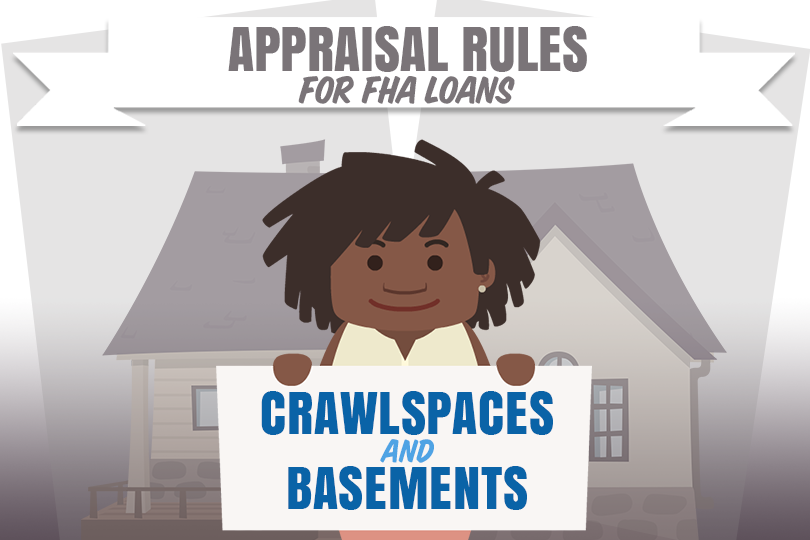FHA Appraisal Rules for Basements
May 7, 2022
You may not be on the hook for those corrections, but if you are trying to negotiate with a seller in a competitive market and you really want that house, negotiating who pays for the appraisal correction might be something to consider.
With that in mind, what are the FHA appraisal rules for a home that comes with a basement or crawlspace? The FHA appraisal process includes specific standards in this area which must be met. In cases where there are corrections required as a condition of loan approval, those corrections must be made and inspected--it’s not done on an honor system.
The basic rules in this area begin with the general condition of the foundation--it must be adequate to properly support the home.
HUD 4000.1 contains rules for the lender and appraiser. It states, “The Mortgagee must confirm that all foundations will be serviceable for the life of the Mortgage and adequate to withstand all normal loads imposed.” And what happens if this is not true?
The FHA list of “defective conditions” for basements, crawlspaces, and the foundation includes:
“…evidence of possible structural failure (e.g., settlement or bulging foundation wall, unsupported floor joists, cracked masonry walls or foundation)”
Such conditions would be noted by the appraiser--corrections are recommended where feasible but such corrections are not always possible. If the problems cannot be corrected, the home cannot qualify for an FHA mortgage.
The foundation and the basement should be “serviceable” over the entire duration of the loan term or must be repaired or modified to make that possible.
According to HUD 4000.1, “The Appraiser must perform a visual observation of the foundation and Structure of the improvements and report those results.” In cases where the FHA appraiser detects a structural issue, HUD 4000.1 says the Appraiser must “address the nature of the deficiency in the appraisal where physical deficiencies or adverse conditions” are reported and which may demand an inspection.
Basement issues may include things not directly related to the structural soundness of the foundation. For example, sump pump systems must be suitable to properly service the home and must be in good repair. If the appraiser notes the sump pump system does not meet these basic requirements, corrections are likely to be required in the appraisal report.
Any evidence of excessive moisture in a basement or crawlspace is an area of concern for the appraisal. If you note standing water, trickling water, or very damp basement walls when you do your initial walkthrough of any property, you can expect the appraiser to note the same problems.
------------------------------
RELATED VIDEOS:
Here's the Scoop on Conventional Loans
When Do You Need a Cosigner?
Analyzing Your Debt Ratio

FHA Loan Articles
January 15, 2025Buying a condo with an FHA loan is an option some don’t consider initially, but it’s worth adding to your list of potential property types. FHA loans for condo units traditionally require condo projects to be on or added to the FHA-approved list. Still, changes in policy over the years allow borrowers to apply for FHA loans on condo units in projects not on the list on a case-by-case basis.
December 30, 2024When applying for an FHA loan, lenders will consider more than just your credit scores and history. They also look at other factors affecting your risk profile and the interest rate they offer you.
One factor is occupancy type. For FHA loans, this is straightforward because these loans require owner occupancy. Investment properties aren't eligible. While conventional loans may have different rates for primary residences, second homes, and investment properties, this isn't a concern with FHA loans.
December 18, 2024Did holiday spending get the better of you? Are you looking for ways to recover your spending plan as you search for a new home?
The holidays are a whirlwind of festivities, family gatherings, and gift-giving. But amidst the cheer, it's easy to lose track of spending. If you're aiming to buy a home in the near future, those extra expenses can have a bigger impact than you might realize, especially if you're considering an FHA loan.
December 17, 2024The Federal Housing Administration provides mortgage insurance on loans made by FHA-approved lenders, making homeownership more attainable for those who might not qualify for conventional loans.
While financial factors like credit score and debt-to-income ratio are key to loan approval, other non-financial aspects can also cause a denial.
December 11, 2024FHA loans, insured by the Federal Housing Administration, are a popular choice for many homebuyers, especially those who need a lower downpayment or more forgiving credit qualifying requirements. FHA loans are primarily intended for primary residences—homes that borrowers will occupy as their main dwelling.







